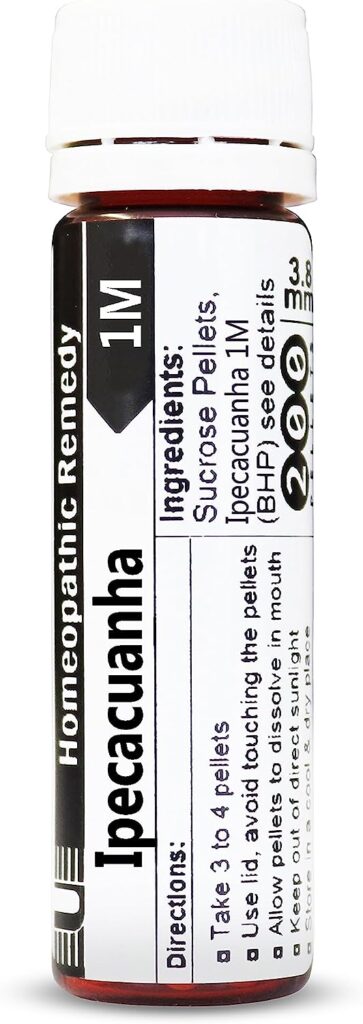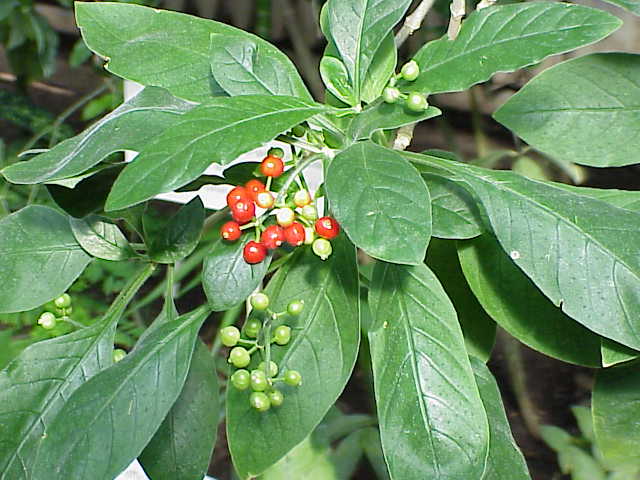Ipecac, scientifically known as Cephaelis ipecacuanha, has a historical trajectory in both conventional and homeopathic medicine. In conventional medicine, it was previously employed to induce vomiting as an emetic in cases of ingested poisons. However, homeopathically, Ipecac offers a distinctive approach to treating specific forms of nausea and vomiting accompanied by a constellation of symptoms.

Nausea:
The Ipecac remedy is particularly relevant in instances of gastrointestinal discomfort, where constant nausea becomes a recurrent theme. Individuals requiring Ipecac often exhibit thirstlessness despite profuse salivation, alongside a clear tongue. Their condition is accentuated by warm environments, and it’s noteworthy that vomiting tends to intensify their discomfort rather than alleviate the underlying complaints.
Respiration:
Ipecac’s efficacy extends to the domain of respiratory ailments, particularly targeting spasmodic respiratory issues such as croup, bronchitis, and asthma. In these cases, the remedy addresses symptoms of a loose cough that worsens in warm, humid conditions, as well as dry, spasmodic coughs culminating in choking, gagging, or vomiting. This is particularly observed in pediatric cases, where conditions like croup and bronchitis manifest with a suffocating, spasmodic cough.
Coughing:
The therapeutic scope of Ipecac is not confined solely to its gastrointestinal and respiratory applications. Instead, it encompasses cases where persistent nausea, vomiting, and spasmodic coughs manifest as primary concerns. The remedy’s application is rooted in the principles of homeopathy, where the totality of symptoms guides its prescription.

Hemorrhages:
Ipecac also demonstrates notable effectiveness in managing hemorrhagic conditions. In cases of uterine hemorrhage characterized by gushes of blood, accompanied by weakness, nausea, and vomiting, Ipecac provides a valuable therapeutic option. Additionally, the remedy showcases its efficacy in the management of sudden and profuse bleeding with slow coagulation, further underlining its potential utility in addressing hemorrhagic episodes.
Ipecac’s role in alleviating pain becomes evident in situations where constant nausea is a concurrent concern. By focusing on the interplay between discomfort and accompanying symptoms, Ipecac emerges as a nuanced solution for individuals facing diverse forms of pain. This distinct trait accentuates the remedy’s compatibility with a comprehensive range of cases where persistent nausea complicates the overall symptomatology.
Veterinary Application:
Applying the principles of homeopathy to veterinary medicine, Ipecac extends its impact to the realm of animal health. For pets, Ipecac remains a valuable option in managing conditions characterized by prolonged nausea and vomiting accompanied by weakness. The remedy’s utility further expands to include instances of sudden and profuse bleeding of bright red blood in animals. By acknowledging Ipecac’s relevance across species, the homeopathic approach leverages its versatile applications to contribute to the holistic well-being of both human and animal populations.

Geographical Context:
Ipecac is native to the tropical regions of South America, particularly Brazil. The name “ipecacuanha” is believed to have originated from the Tupi-Guarani language, translating to “roadside sick-making plant,” indicating its historical use as an emetic. The plant’s geographical origin is in the lush rainforests of South America. The high humidity and diverse ecosystems of this region contributes to the unique chemical composition that underlies its medicinal properties.
